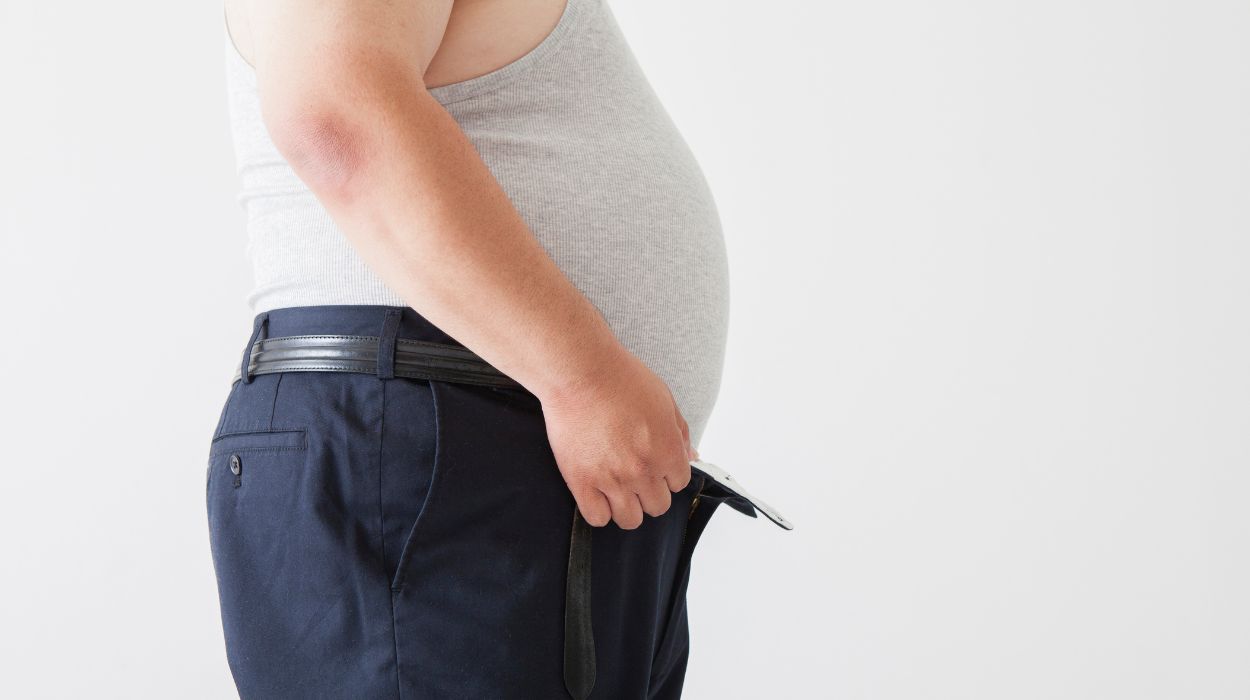How To Lose Belly Fat Without Working Out In 2024 – 8 Tips You May Need

It is common for people on a weight loss journey to want to reduce belly fat, but sometimes it seems like stubborn stomach fat just wants to stick around. People often turn to intense workouts to try to drop fat, but some people simply don’t want to spend time in the gym.
You’re not alone if you want to learn how to lose belly fat without working out. Not everyone has the time or the desire to spend hours in the gym trying different exercises to drop stomach fat.
You can learn how to lose belly fat without exercise with the strategies below. These strategies require time and consistency, so don’t become discouraged if you don’t immediately lose stomach fat. Instead, stick to your plan for around three to six months, and you should see the changes you desire.
8 Methods To Lose Belly Without Exercising
Working out can benefit weight loss, but some people prefer to learn how to lose belly fat without working out. If you want to get rid of stubborn tummy fat without spending time in the gym, consider the strategies below:
- Count your calories.
- Consider a detox.
- Follow a high-protein diet.
- Reduce carbohydrate intake.
- Try alternate-day fasting.
- Increase your step count.
- Eat more fiber.
- Prioritize sleep.
8 Best Ways To Lose Belly Fat Without Working Out
Working out can be helpful for belly fat loss because it increases your calorie burn; however, it isn’t essential, as you can achieve weight loss without working out. Use the strategies below to drop belly fat without exercise.
Featured Partner Offer

PhenQ
- Helps to burn fat
- Crushes food cravings
- Boosts energy and balances mood
- High-quality formula
Money Back Guarantee and Free US Shipping
Count Your Calories

At the end of the day, fat loss occurs when you eat in a calorie deficit, meaning you consume fewer calories than you’re burning. Tracking your calories is important to know how much you’re consuming to achieve a calorie deficit.
If you aren’t sure how many calories you burn daily, you can use a free online calculator to determine the answer. These calculators will estimate how many calories you burn daily based on your weight, age, gender, and activity levels.
However, those calorie calculator formulas are sometimes unreliable because each individual has different genetic and environmental factors. Therefore, you can try to understand how many calories you consume currently and decrease calories from that amount to start. Try to listen to your body and manage your needs. It is better to ask your health provider to get help.
Once you determine a daily calorie burn, you can reduce your calorie intake to fall below the number you’re burning daily.
Low-calorie and very low-calorie diets typically recommend[1] a deficit of 500 to 750 calories daily for weight loss. So, if a calories-burned calculator tells you that you are burning 2,000 calories daily, reducing your intake to 1,250 to 1,500 per day can help with belly fat loss.
Remember that if you choose not to work out, your daily calorie burn will be lower, so you may need to cut more calories compared to working out for fat loss.
Increase Fruit And Vegetable Intake
People who are interested in losing weight without exercising may be tempted to try extreme measures, like a lemon juice detox, to drop weight, but these methods can backfire. Detoxes may result in initial weight loss because they require such a low-calorie intake, but weight loss from this method is rarely sustainable.
Instead of doing a juice detox, add more fruits and vegetables to your diet. These will keep you full and satisfied, so you can maintain a lower calorie intake. Research[2] with women has shown that fruit and vegetable intake is important in weight loss.
To be most effective, you should consume whole fruits and vegetables rather than juices. The fiber and water content will keep you full, with very few calories.
Follow A High-Protein Diet
To lose fat without working out, following a high-protein diet can be beneficial. High-protein foods will keep you full for longer, making it easier for you to stay in a calorie deficit for weight loss. Clinical research[3] in the journal Obesity Facts has confirmed the benefits of protein for weight loss. A study in the journal followed participants for six months and found that those on a high-protein diet lost around 15 pounds and 3.5 inches off their waists.
For the sake of comparison, participants in a control group lost an average of 11 pounds and 2.5 inches over the course of the study. All participants followed a low-calorie diet, so it wasn’t just protein that led to weight loss, but protein can certainly keep you full so that you can continue to eat within a calorie deficit for fat loss.
If you’re unsure of how to get more protein in your daily diet, consider adding more eggs, lean meats, and beans to your diet. These foods are all rich protein sources, which can keep you full and prevent overeating. Check out the nutrition facts label before buying foods at the grocery store, and try to choose more foods that are a good source of protein. A protein shake or a smoothie made with protein powder and fruits can be a good way to squeeze extra protein into your day without too many calories.
Reduce Carbohydrate Intake
A low carbohydrate diet can benefit those who want to learn how to get a slim waist without exercise. Cutting carbs from your diet will naturally reduce your calorie intake since you’ll get fewer calories from carbohydrates. According to the results of a meta-analysis of 38 studies,[4] a low-carb diet was found more effective in weight loss than a low-fat diet.
A study[5] in Evidence-Based Complementary and Alternative Medicine followed participants for eight weeks while they consumed a deficient carbohydrate diet, defined as fewer than 20 grams of carbohydrates per day. After eight weeks, they lost, on average, around 8.7 kilograms, equal to 19 pounds.
Participants in the study also lost a significant amount of body fat, demonstrating that low-carb diets are beneficial for reducing body fat levels. If you’re not exercising, a low-carb diet provides a method of reducing your calorie intake so you can achieve abdominal fat loss.
Try Fasting
Intermittent fasting has become more popular in the world of dieting and weight loss. A specific form of intermittent fasting called alternate day fasting may be a solution if you want to lower belly fat levels without working out. With this dietary method, people typically eat normally for one day, called the “feast” day, and then completely fast or consume a very small amount of calories the next day, which is called the fasting day.
A recent study[6] in Obesity Science and Practice evaluated the effects of an alternate-day fasting paradigm in which participants consumed 600 calories on fasting days and then alternated these days with a feast day, during which they ate normally. Study results showed that this diet was effective for fat loss, and weight loss was maintained over time.
Remember that if you are new to fasting, you do not need to use such an extreme approach. You can try basic intermittent fasting, which has an 8-hour eating window and then a 16-hour fasting period. For example, you might consume all of your calories from 10 am to 6 pm and then fast until the next day at 10 am.
If you find it difficult to stick to a calorie deficit to allow you to lose weight without working out, intermittent fasting can be a solution. You’ll simply have to go longer without eating, knowing that you can return to consuming what you like during your eating window. This pattern can protect you from giving up on dieting.
Increase Your Step Count
If you’re looking for strategies for how to lose belly fat without exercise, you might be wondering why there’s any talk of increasing steps, but the truth is that getting more steps doesn’t mean you have to do a formal workout. You can increase your daily steps without ever setting foot in a gym.
For example, you can take the stairs instead of the elevator, walk around the parking lot for ten minutes of your lunch break while talking to a work friend, or walk alongside your children while they ride their bikes after dinner. All of these activities will increase your step count and also help you burn more calories for fat loss.
The research supports increased steps as a method for fat loss. One study[7] that focused on helping participants increase their step count found that after six months, those taking more steps lost a significant amount of weight and body fat when compared to those in a control group. Each increase of 1,000 steps per day was associated with a little over half a pound of fat loss after three months.
Adding just a few thousand steps per day can really make a difference when you’re looking to lose belly fat. This still allows you to lose weight without working out because you won’t have to go to a gym or follow any sort of formal exercise routine.
Eat More Fiber

Higher fiber intake can benefit those who want to learn how to lose weight without exercising. Fiber will keep you full, so you aren’t tempted to overeat or reach for extra snacks. Over time, this will help you stick to your calorie deficit to achieve belly fat loss.
Clinical research[8] has shown that increasing fiber intake by just 10 grams daily can lead to significant fat loss. Fat loss with increased fiber intake occurs independently of calorie intake, so fiber may confer additional benefits above and beyond reducing your calories. This can make fiber especially helpful for those who want to drop belly fat without intense workouts.
Some good choices for increasing fiber intake include fruits, veggies, whole-grain cereals, and breads. Consult with your physician or a nutritionist if you’re unsure of how to add more fiber to your diet. You can also read food labels to look for information on fiber content and choose foods that are a good source of fiber.
Prioritize Sleep
You probably already know that sufficient sleep is important for overall health and functioning, but it can also play a critical role in weight loss. One recent study[9] found that people who had a low sleep duration were less successful with weight loss. Those who had a greater variability in sleep habits, meaning they sometimes slept more and sometimes slept less, were also less likely to be successful with fat loss.
The authors of the study concluded that people are more likely to be successful with fat loss if they have consistent sleep habits as well as sufficient sleep duration, defined as seven to nine hours of sleep per night. Make a habit of going to bed at the same time every night and waking up around the same time every morning, and make sure that your bedtime allows for a full night of sleep. This will help you to lose fat, even if you aren’t exercising.
When you’re consistently well-rested, you’ll be prepared to make better food choices throughout the day, so you won’t be turning to sweets or other fast, easy food options out of convenience. A well-rested body and mind are also able to think more clearly, and less likely to turn to extra calories as a source of energy. All of this makes it easier to stick to a low-calorie diet to promote the loss of belly fat.
Featured Partner Offer

Things To Avoid While Losing Belly Fat Without Working Out
When you’re trying to lose belly fat without exercise, it’s important to be meticulous with your diet so you don’t consume too many calories. This means you must avoid anything that adds excess calories to your day. For example, condiments, dressings, and sugary beverages may add extra calories without you even realizing it!
Even if you’re choosing not to work out, it’s also a good idea to avoid being entirely sedentary. Remaining seated for the entire day will mean that you’re not burning many calories beyond your resting metabolic rate. This can make it difficult to remain in a calorie deficit for fat loss. Some research[10] has even found that increases in sedentary time are associated with a larger waist size.
To combat the negative effects of a sedentary lifestyle, make an effort to at least get up and move around throughout the day. Play outside with your children, walk the dog, park farther from the door when you go to the store, or try to go shopping by walking. Short bursts of movement don’t necessarily mean you’re working out, but they add up to additional calorie burn over the course of the day.
Conclusion
People often exercise when they’re trying to lose fat because working out increases calorie burn and makes it easier to remain in a calorie deficit for weight loss. However, you can drop belly fat without working out, if you’re committed to tracking your calories, eating in a calorie deficit, and using dietary strategies, such as increasing your fiber intake, to make it easier for you to stick to a calorie deficit.
Always remember your weight gain wasn’t sudden. Therefore, you shouldn’t expect to lose weight in just a couple of days. A healthy diet and avoiding consumption of processed foods also helps your digestive system to get rid of bloating.
Keep in mind that belly fat loss may be slower and having a calorie deficit may be a bit harder without exercising, compared to if you do make time to work out. You won’t burn as many calories over the course of the day. Therefore, you will need to be strict with a calorie deficit so that you do not eat too many calories for weight loss.
Frequently Asked Questions
You can lose belly fat without exercising, but it will likely take longer compared to if you exercise since you won’t be burning extra calories from workouts.
If you’re not dropping belly fat despite dieting, take a look at your calorie intake. You need to be in a calorie deficit for fat loss, and you could be eating too many calories.
You may be able to get a nice start on tummy fat loss with seven days of a low-calorie, high-protein diet.
Slow and steady weight loss is the best way to lose tummy fat. You can promote faster fat loss by eating in a calorie deficit.
To lose belly fat without exercise, you need to be in a calorie deficit. You may need to cut your calories lower than if you were exercising since you won’t be burning as many.
Resources
- Ju Young Kim (2021). Optimal Diet Strategies for Weight Loss and Weight Loss Maintenance. Journal of obesity & metabolic syndrome, [online] 30(1), pp.20–31. doi:https://doi.org/10.7570/jomes20065.
- Dreher, M.L. and Ford, N.B. (2020). A Comprehensive Critical Assessment of Increased Fruit and Vegetable Intake on Weight Loss in Women. Nutrients, [online] 12(7), pp.1919–1919. doi:https://doi.org/10.3390/nu12071919.
- Campos‐Nonato, I., Hernandez, L. and BarqueraS. (2017). Effect of a High-Protein Diet versus Standard-Protein Diet on Weight Loss and Biomarkers of Metabolic Syndrome: A Randomized Clinical Trial. Obesity Facts, [online] 10(3), pp.238–251. doi:https://doi.org/10.1159/000471485.
- Chawla, S., Fernanda Tessarolo Silva, Sofia Amaral Medeiros, Mekary, R.A. and Radenković, D. (2020). The Effect of Low-Fat and Low-Carbohydrate Diets on Weight Loss and Lipid Levels: A Systematic Review and Meta-Analysis. Nutrients, [online] 12(12), pp.3774–3774. doi:https://doi.org/10.3390/nu12123774.
- Gu, Y., Yu, H., Li, Y., Ma, X., Lu, J., Wang, Y., Xiao, Y., Bao, Y. and Jia, W. (2013). Beneficial Effects of an 8-Week, Very Low Carbohydrate Diet Intervention on Obese Subjects. Evidence-based Complementary and Alternative Medicine, [online] 2013, pp.1–8. doi:https://doi.org/10.1155/2013/760804.
- Kalam, F., Gabel, K., Cienfuegos, S., Wiseman, E., Ezpeleta, M., Steward, M., Pavlou, V. and Varady, K.A. (2019). Alternate day fasting combined with a low‐carbohydrate diet for weight loss, weight maintenance, and metabolic disease risk reduction. Obesity science & practice, [online] 5(6), pp.531–539. doi:https://doi.org/10.1002/osp4.367.
- Anoop Sheshadri, Piyawan Kittiskulnam, Lai, J.C. and Johansen, K.L. (2020). Effect of a pedometer-based walking intervention on body composition in patients with ESRD: a randomized controlled trial. BMC Nephrology, [online] 21(1). doi:https://doi.org/10.1186/s12882-020-01753-5.
- Kahleová, H., Dort, S., Holubkov, R. and Barnard, N.D. (2018). A Plant-Based High-Carbohydrate, Low-Fat Diet in Overweight Individuals in a 16-Week Randomized Clinical Trial: The Role of Carbohydrates. Nutrients, [online] 10(9), pp.1302–1302. doi:https://doi.org/10.3390/nu10091302.
- Papandreou, C., Mònica Bulló, Andrés Díaz‐López, Miguel Ángel Martínez‐González, Corella, D., Castañer, O., Jesús Vioque, Romaguera, D., Martı́nezA., Napoleón Pérez-Farinós, José López‐Miranda, Ramón Estruch, Bueno‐Cavanillas, A., Alonso‐Gómez, Á.M., Tur, J.A., Tinahones, F.J., Luís Serra-Majem, Martín, V., José Lapetra and Vázquez, C. (2019). High sleep variability predicts a blunted weight loss response and short sleep duration a reduced decrease in waist circumference in the PREDIMED-Plus Trial. International Journal of Obesity, [online] 44(2), pp.330–339. doi:https://doi.org/10.1038/s41366-019-0401-5.
- Saunders, T.J., Tremblay, M.S., Jean‐Pierre Després, Bouchard, C., Tremblay, A. and Chaput, J. (2013). Sedentary Behaviour, Visceral Fat Accumulation and Cardiometabolic Risk in Adults: A 6-Year Longitudinal Study from the Quebec Family Study. PLOS ONE, [online] 8(1), pp.e54225–e54225. doi:https://doi.org/10.1371/journal.pone.0054225.
More from Weight Management
-

How To Drink Apple Cider Vinegar For Weight Loss In 1 Week In 2024
January 10, 2024
Taking apple cider vinegar has become a sensation for its supposed health benefits, despite its sour taste. Apple cider vinegar may…Read more -

How To Lose Belly Fat After 50: Here’s 10 Tips For People Over 50 To Try In 2024
December 27, 2023
Losing weight over 50 can feel challenging, especially in stubborn areas like the abdomen. As we age, hormonal changes, slower metabolism,…Read more -

How To Lose Weight With Hypothyroidism – 10 Ways You Should Try In 2024
December 22, 2023
Hypothyroidism[1] is a condition that occurs when a person has low levels of thyroid hormone, and it most often develops when…Read more -

Hypnosis For Weight Loss: Unlocking Your Mind’s Potential For Success 2024
December 20, 2023
You’ve heard about various methods and tools to achieve weight loss and you might have looked into how to get ozempic.…Read more


